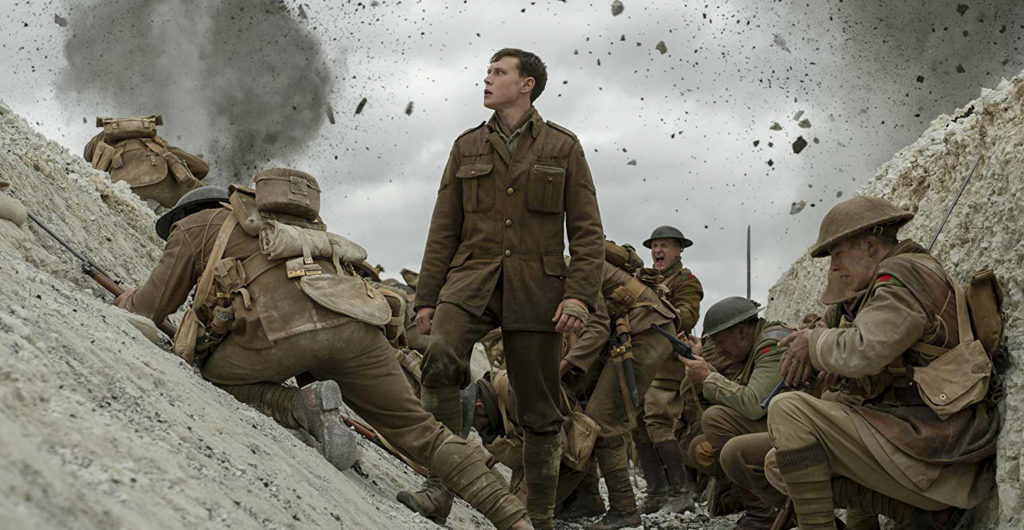
With the Oscars less than one month away, the race for Best Picture is finally starting to take shape. One film has joined the ranks as a new contender for the coveted prize: “1917.”
The new war movie from Sam Mendes (“Skyfall”) won Best Drama Picture and Best Director at the Golden Globes, received eight nominations from the British Academy of Film and Television Arts (BAFTA) and just collected ten Oscar nominations, including those for Best Picture and Best Director. Beyond the numbers, though, what makes “1917” such a presumed favorite?
For one reason, as long as the Oscars and the Academy have existed, they have expressed consistent adoration for historical dramas and war movies. Moreover, “1917” is being presented as a one-shot film — a method that gives viewers the appearance that they are watching one continous take of the camera, achieved by stitching together long, tracking shots with limited and veiled cuts. In recent memory, this technique has garnered praise and awards, as was the case for 2014’s “Birdman,” which won Best Picture.
However, for Mendes’s latest work, this filmmaking decision is not a gimmick for attention but a tool to enhance storytelling.
Bearing much similarity to “Saving Private Ryan,” the script penned by Sam Mendes and Krysty Wilson-Cairns (“Penny Dreadful”) follows a pair of British soldiers during World War I on an against-all-odds mission to stop a devastating military loss and save the life of a brother. The protagonists, Lance Corporals Blake and Schofield, are played respectively by relative newcomers Dean-Charles Chapman (“Before I Go To Sleep”) and George MacKay (“Captain Fantastic”). After the duo receive their orders from General Erinmore (Colin Firth, “The King’s Speech”) they depart on their mission immediately. On their journey, the soldiers encounter a murderous row of famous British actors, including Andrew Scott (“Sherlock”), Mark Strong (“Kingsman”) and Benedict Cumberbatch (“Doctor Strange”).
While the camerawork — shot by the legendary Roger Deakins (“No Country for Old Men”) — is dazzling and impressive, technically, what is almost more remarkable is just how effective, purposeful and cohesive it is with the narrative. As the camera follows Blake and Schofield through the trenches, it evokes an uncanniness that mirrors the impossibility and danger of their mission. In calmer moments, the presentation captures the humanity of two friends hiking through a literal warzone. At its most suspenseful, the boldness of the filmmaking matches the protagonists’ general defiance of fear and death.
In other words, Deakins and Mendes are not employing the one-shot method to be flashy or simply because they can — they utilize it purposefully to improve their visual storytelling.
While “1917” is certainly not a perfect movie, few are. At times, some writing choices and staging decisions break the realism that the film works tirelessly to construct. When Schofield sprints across open fields as mortars strike and soldiers charge behind him, it can be easy to remember that this is still a movie. Being unrealistic is not a crime in itself, but when it undermines the general vibe and atmosphere of a movie, it can detract from the viewing experience.
Moreover, despite some awards attention for composer Thomas Newman’s (“Skyfall”) score, the World War I epic does not quite feel like a very symphonically assembled movie. The edits (or lack thereof), sound design and score often fail to click with the on-screen narrative in the same way that Deakins’s cinematography does. To put otherwise, while some films feel like they are firing on all cylinders, “1917” seems to fire on only two.
These imperfections are not indications of poor quality. Rather, they reflect a film just shy of literal perfection in a couple regards, which is still quite impressive.
War might be hell, but “1917” is a hell of a war movie, and although the pack of contenders is particularly deep for this year’s Oscars races, it would not be particularly surprising to see Sam Mendes and Roger Deakins accepting awards on behalf of their acclaimed war film.
